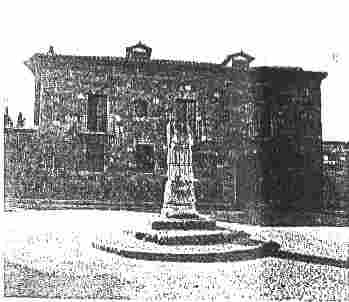THE BERDUGO FAMILY
WHERE DID THE BERDUGO’S COME FROM?
(from Loeb/Berdugo family site)
also click on Eternal House of David button above
Family name of many distinguished rabbis in Morocco, chiefly in Meknes of Davidic Ancestry. They left Spain and Portugal (Pontevedra province) around the time of the Inquisition (1492). Click here for the Berdugo family origins
According to Rafael Gonzalez Berdugo, the town of Arevalo was the ancestral origin of the Berdugos. The Jewish population was so important in Arevalo, that out of a total amount of 14,000 inhabitants, 4,000 were Jews.
In the Middle Ages one of the political powers was in Burgundia or Berungia (or Burgundy). When Jews emigrated from France to Spain they did not have surname yet. Things being so, in Spain they asked them where they had come from. Those coming from Berungia were called Berugos, later Berdugos.
When the Inquisition took place, some Berdugos converted to Catholicism and stayed in Spain. The rest remained being Jews and left for Morocco. Today most Berdugos are Jews and most Verdugos are not. (This confusion between "b" and "v" was very common, for they sound the same in Spanish and are both the same letter in Hebrew).
In the Pontevedra province of Spain is a town named O Verdugo (in the Council of La Lama about 25 km from Pontevedra city) and also a river with the same name Rio Verdugo. In Tuy (Pontevedra) there was a ghetto called Tora de los Judios.
Etymology
According to Laredo, and Eisenbeth the name Berdugo (written Beth-
According to Raphael Berdugo, the family's name is a deformation of Verge di Oro, the golden scepter or sharbit hazahav, in Portugese. According to family tradition supported by an official document, the family descends from the Rabbi Boustani Gaon, descendant of King David. (One of his books was entitled The Golden Scepter.) (According to David Kelley, Boustani means sprout in Persian, just as does the name Berdugo in Portugese, for Boustani was believed to be the last surviving branch of the royal family of Judah.)
According to Rabbi Shalom Messas (chief Sephardic rabbi of Jerusalem) in its transformation from Portugese, the letter "B" was confused with "P" and the letter "L" disappeared. Thus, Berdugo refers to the Pontevedra province in Spain
BERDUGO
(from Encyclopaedia Judaica p519)
family name of many distinguished rabbis in Morocco, chiefly in Meknes.
According to tradition, the family was of Davidic descent through the exilarch Bustana,
YAHYA (or Hiyya) Berdugo (d.1617) endorsed an ordinance in Fez in 1605, later left for Tetuan and was nominated deputy rabbi there in 1614.
A YAHYA Berdugo was known in Meknes about the same time but it is not certain whether they are identical or not.
MOSES BEN ABRAHAM, called "Mashbir" (c. 1679 -
JUDAH BEN JOSEPH 1 (1690 -
MORDECAI BEN JOSEPH. "Ha Marbiz" (1948): others are still extant in manuscript.
RAPHAEL (1747 -
MAIMON "the Mevin" (1767 -
PETHAHIAH MORDECAI BEN JEKUTHIEL ([764—1820) was the author of Nofet Zufim,. responsa (1938), and Pittuhei Hotam. a commentary on the Talmud (unpublished).
JACOB 1783 -
JOSEPH (1802 -
JACOB BEN MORDECAI (d. 1901), brother of Joseph, was an av bet din in Meknes. SOLOMON BEN DANIEL (1854 -
JEKUTHIEL HAYViM BEN ELISHA ~(I858 -
JOSHUA BEN JACOB (1878 -
The civil monument most representative of Aranda is a Berdugo palace. It is a symbol of the glorious age of palace life. It was constructed in the 15th century by Martin Durango. The restoration and conservation of the abode was been praised by many experts. The current owner Don Fernando Redondo Berdugo received the silver medal from the Spanish Association of Friends of Castillians for the palace's artistic sence. It is considered one of the most remarkable private homes of the 15th century. Its founder was named Chevalier de la Bande and Gardien du Principe Don Enrique by King Juan II. During the 16th century, the palace was transferred to the Tamayo family by the marriage with Dona Maria Durango. Finally, towards the end of the 18th century, the palace passed to the hands of the Berdugo family by marriage.
One book mentions that most of the jews of the region (Galicia, Spain) were "converted" and did not actually leave Spain until the middle of the 16th century.
